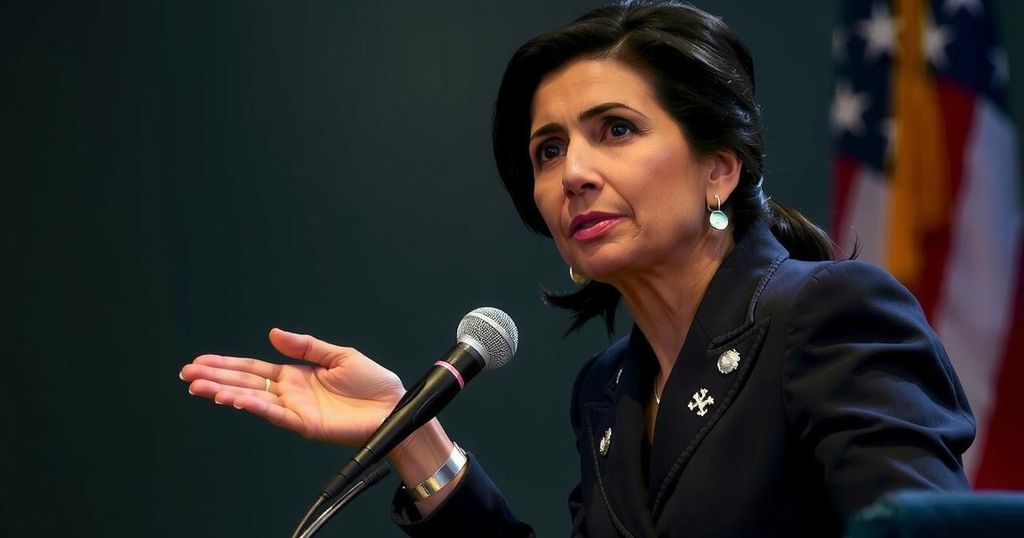Tulsi Gabbard Faces Scrutiny as Trump’s DNI Nominee over Controversial Positions
Tulsi Gabbard’s nomination as Director of National Intelligence by Donald Trump has drawn scrutiny due to her controversial past regarding Syria and Russia. Critics express concern about her anti-war stance and past interactions with Assad, suggesting she may undermine U.S. intelligence operations and relationships with allies. While some defend her military background, Gabbard faces significant obstacles in her confirmation process amid bipartisan apprehension.
Former congresswoman Tulsi Gabbard’s nomination by President-elect Donald Trump to lead the U.S. intelligence community has sparked significant debate and scrutiny, primarily due to her controversial past positions on Syria and Russia. If confirmed as the Director of National Intelligence (DNI), Gabbard would assume a vital role overseeing 18 U.S. spy agencies and advising the president directly. Critics, including former national security officials, have expressed concerns regarding Gabbard’s anti-war stance and past interactions with foreign leaders, particularly her meeting with Syrian President Bashar al-Assad in 2017.
Gabbard’s views have historically attracted both praise and criticism from across the political spectrum. Her opposition to American military interventions and skepticism of U.S. intelligence assessments, especially regarding Assad’s use of chemical weapons, have raised alarms about her suitability for the DNI position. Critics argue that her past comments, particularly those perceived as sympathetic to Kremlin narratives during conflicts, could undermine alliances and intelligence-sharing cooperation with foreign governments. Despite these criticisms, Gabbard maintains that her detractors are merely employing partisan tactics to vilify her.
The Trump administration has defended Gabbard’s nomination, arguing that her extensive military experience and desire for reform within the intelligence community qualify her for the role. However, her nomination’s implications for U.S. foreign relations, particularly with NATO allies and intelligence partners, cannot be overlooked. Some officials speculate that her past remarks could lead to increased skepticism from allied nations regarding U.S. intelligence reliability under her leadership, while others assert that long-standing alliances are likely to endure regardless of individual nominees.
As Gabbard’s confirmation process unfolds, senators are likely to scrutinize her past views closely. Issues she raised during her political career, especially concerning Assad and Russia, present significant hurdles in garnering bipartisan support for her nomination. Prominent political figures from both parties have voiced apprehension over the potential ramifications of her leadership on U.S. intelligence diplomacy. Ultimately, Gabbard’s ability to navigate the confirmation landscape will involve addressing these concerns head-on and reassuring lawmakers of her commitment to U.S. national security interests.
The appointment of a Director of National Intelligence (DNI) is a critical decision in the U.S. government, as this individual oversees the nation’s intelligence operations and finalizes the information included in the president’s daily briefing. The role necessitates not only a deep understanding of global threats but also the ability to foster trust and cooperation among domestic and international intelligence communities. Tulsi Gabbard’s nomination raises questions about her positions taken throughout her political career, especially regarding America’s involvement in foreign conflicts and her prior interactions with leaders like Bashar al-Assad and statements on Russia’s foreign policy.
In conclusion, Tulsi Gabbard’s nomination as Director of National Intelligence poses a potential challenge for U.S. intelligence relationships both domestically and abroad. Her past positions and controversial standpoints bring with them questions about her judgment and the impact on alliances. As she faces scrutiny during her confirmation process, it remains crucial for her to address the concerns of lawmakers while galvanizing support within the Senate.
Original Source: www.bbc.com




Post Comment